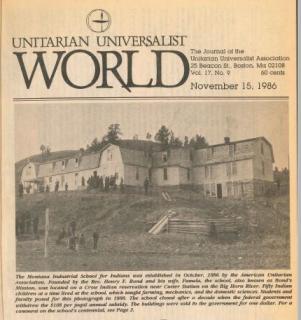Acting Locally
Educate Yourself and Invite Others to Join You
Learn More about the Doctrine of Discovery and its Effects
- Read or view some of the resources on UUA.org about the Doctrine of Discovery, its effects, and the movement to repudiate it.
- Learn about the United Nations Declaration on the Rights of Indigenous People.
- Read and discuss An Indigenous Peoples’ History of the United States, written by Indigenous scholar and activist Roxanne Dunbar-Ortiz (Beacon, 2015). An online discussion guide (PDF, 18 pages) helps groups and congregation delve together into the spiritual, emotional, and intellectual challenges of seeing their nation’s history through an unfamiliar and painful lens. The guide provides plans for a single session or a series of three.
- Read and share the story of the Ute and the Unitarians. View the video of Rev. William Sinkford telling the story at General Assembly 2009 and, on behalf of the UUA, acknowledging the complicity of Unitarians in the violent displacement and forced assimilation of indigenous people in the United States.
- Research the history of places that are significant to you to find out about the taking of land, about treaties negotiated (and often broken), and about programs of forced cultural assimilation. Check with local universities, historical societies, national parks or national historic sites, or reference libraries to discover websites and books that offer truthful histories of what has happened between indigenous people and settlers in those places which are most important to you.
- Find out about organizations of Indigenous or Native people in your area. Places to begin include local universities, which sometimes have native student groups, state, county, or local government websites, which may provide links to such organizations.
- Expand your awareness and support of Indigenous culture.
- Visit Native cultural centers, attend events open to the public, and support local Indigenous artists, programs, and tribal colleges
- Show/read and discuss films, documentaries, books, and articles by Native producers and authors (check out Indigenous Peoples Day for suggestions or subscribe to Indian Country Today)
- Invite Native speakers to services, forums, and workshops
- Honor Indigenous Peoples Day as part of your congregational year. Check out ten ways to celebrate Indigenous Peoples Day.
- Begin a conversation with people of all ages that rejects the mythology of the American Thanksgiving holiday. Consider: how might we reimagine a festival of Thankgiving and gratitude that does not rest on a story of appropriation and colonization? To get started, read the article, Why I am Not Thankful for Thanksgiving, by Michael Dorris, published by Rethinking Schools. You might also check out Re-thinking Thanksgiving: The Complete Story, a 3-part newspaper series written by traditional storyteller Perry Ground, a Turtle clan member of the Onondaga Nation, part of the Haudenosaunee (Iroquois) Confederacy.
Build and Sustain Relationships
Reach Out to Indigenous Peoples’ Organizations and Groups in Your Area
- Read about the work of other Unitarian Universalist congregations and note how their relationships and justice work began and developed.
- Listen and be alert for initiatives, projects, and events that are important to local Native groups. Issues and concerns of Indigenous people cover a wide range of topics. Environmental justice, education and child welfare, health care, violence against women, land rights and treaty rights, and cultural and language preservation are but a few.
- Offer to serve a behind-the-scenes role in an event or project organized by an Indigenous peoples’ organization.
- Offer helpful assets to support Native-led projects, such as building space, financial support, and publicity
- Consider inviting leaders of local Native groups to help you offer a service centered around Indigenous issues. Donate the collection plate to their organization or another working on justice issues for Indigenous people. A prime opportunity for such a service is Indigenous Peoples Day.
An Indigenous Peoples’ History of The United States10th-Anniversary Edition
By Raoul Peck, Roxanne Dunbar-Ortiz
From Beacon Press
This American Book Award–winning title about Native American struggle and resistance radically reframes more than 400 years of US history. Free discussion guide available


